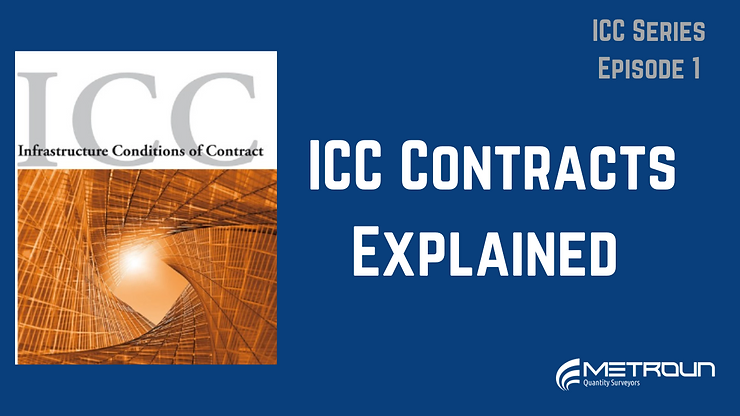The Infrastructure Conditions of Contract (ICC), widely used across civil engineering works, has a long history dating back to 1945. Originally introduced as the ICE Conditions of Contract, it was republished in 2011 as the ICC following decades of revisions and updates.
Since then, the ICC has developed into a flexible suite of contracts that cater to a wide variety of project types, ranging from straightforward minor works to complex collaborative schemes with shared risk. Below, we’ll explore the key versions of the ICC currently in use.
ICC Design and Construct
- For projects where the contractor is responsible for both design and construction in line with the employer’s requirements.
- Payment is generally on a lump sum basis, though other methods can be agreed.
- The employer may also provide elements of the design, but overall responsibility rests with the contractor.
Measurement Version 2011
- Intended for engineer/consultant-designed works, where construction is delivered by the contractor.
- Payment is valued by admeasurement (“measure and value”).
- All design work and preparation of drawings should be complete before tender.
Measurement Version with NR8 Track Amendments
- Drafted in conjunction with Network Rail.
- Used for Plain Line contracts and part of Network Rail’s overall contract strategy.
- ICC contracts are a core part of the Network Rail contract suite.
Minor Works Version 2011
- Best suited to simple, straightforward works with low risk to both employer and contractor.
- Employer provides all relevant information to the contractor at the outset.
- Payment methods are flexible, chosen via the Appendix to the contract.
ICC Target Cost Versions
Target Cost Version 2011
- Encourages the contractor to engage more closely in aspects of design.
- Payment is based on a cost-reimbursable model plus fee percentage.
- Includes an incentive share arrangement where cost savings or overruns are shared between parties.
- Designed to promote collaboration and joint risk management.
Target Cost Version 2018
- Builds on the 2011 version with updates to reflect current practice and government guidance.
- The contractor is paid a target cost plus fee.
- Cost savings and overruns are shared according to pre-agreed percentages.
ICC Target Cost Version with NR12 Amendments
- Drafted with Network Rail to support its Target Cost projects.
- Integrates NR12 amendments, providing clarity on roles and responsibilities.
Term Version 2011
- For planned and reactive maintenance, refurbishment, emergency works, or new works within a geographical area.
- Based on engineer/consultant-designed and contractor-built arrangements.
- Works are issued via Works Orders and valued by measurement against agreed rates or other pricing mechanisms.
Sub-Contract 2017
- Fully compatible with the wider ICC suite.
- Reflects modern industry practice and complies with current payment legislation.
- Designed to accommodate BIM processes.
- Recognises and fairly apportions risks between contractor and subcontractor.
Final Thoughts
The ICC suite of contracts has evolved to suit a broad range of project types, from minor works through to collaborative target cost projects. With specialist versions tailored to Network Rail projects and others adapted for design-and-construct responsibilities, the ICC remains a central part of the UK civil engineering contractual framework.
In the coming weeks, we’ll be publishing in-depth articles on each ICC contract version, exploring their structures, benefits, and practical applications.
Find out how we can help at metroun.co.uk










